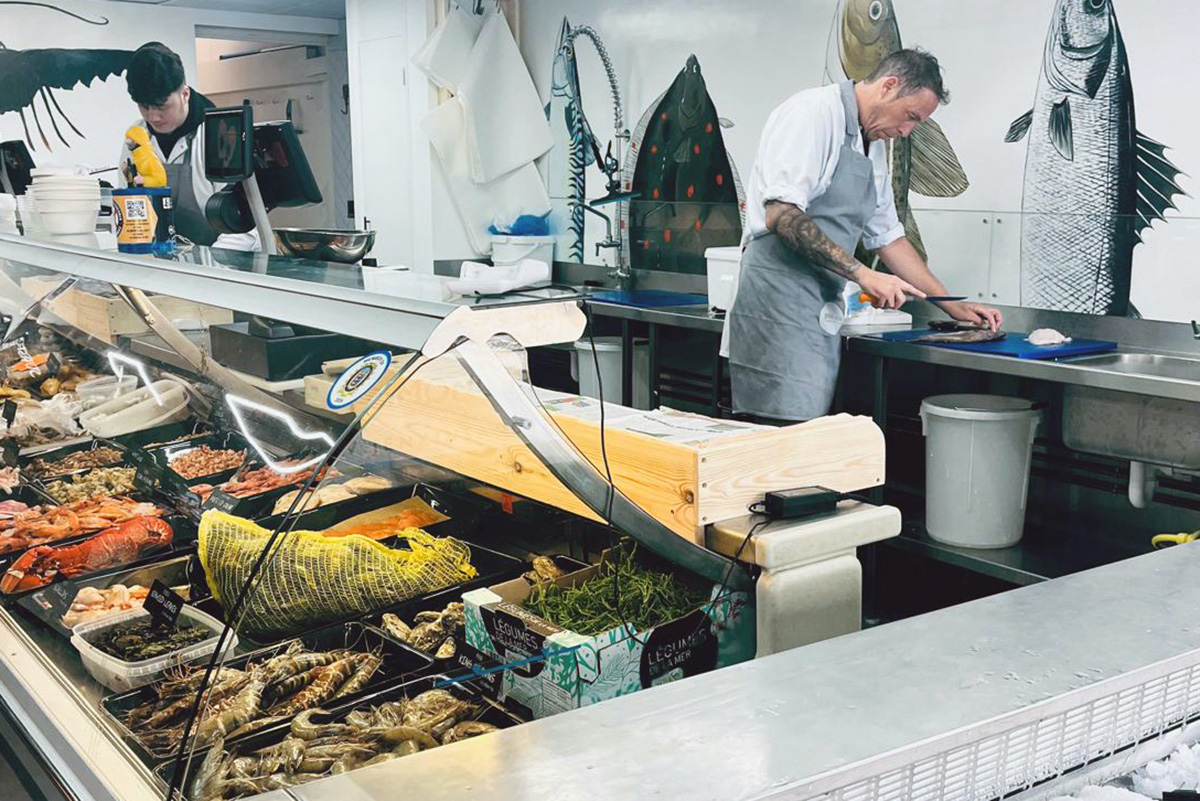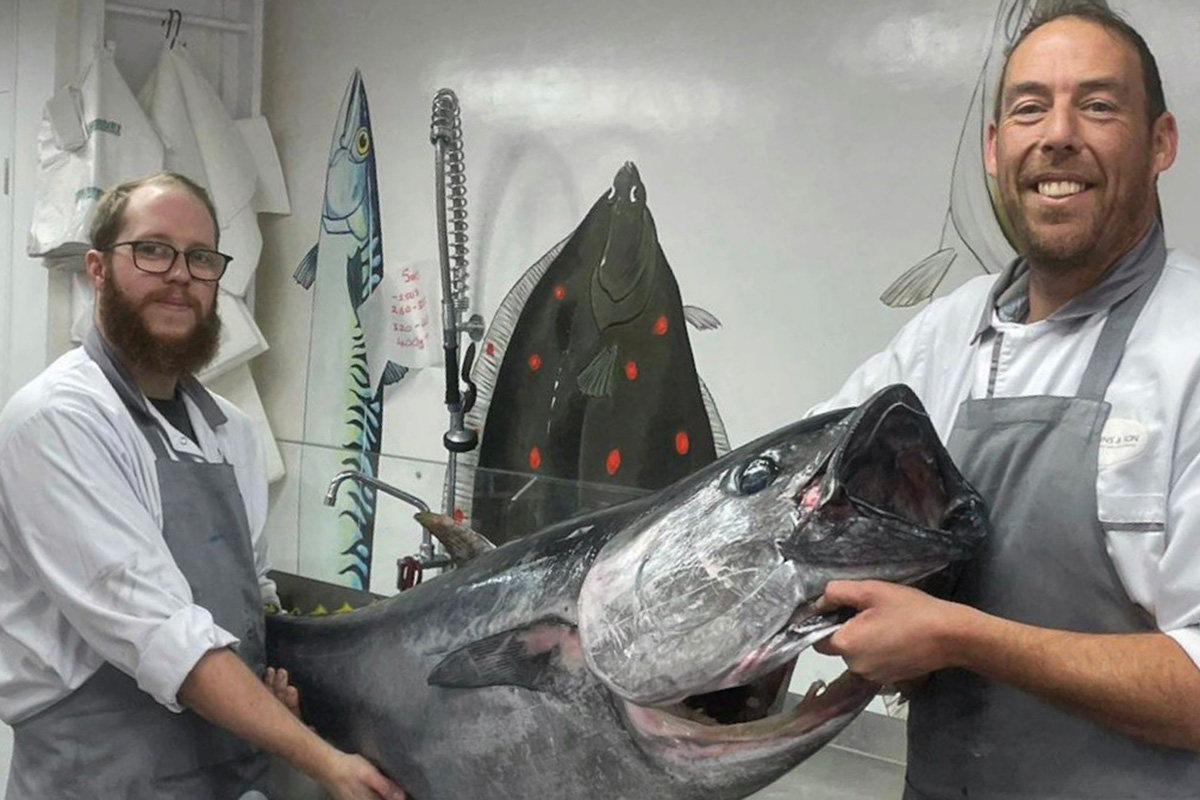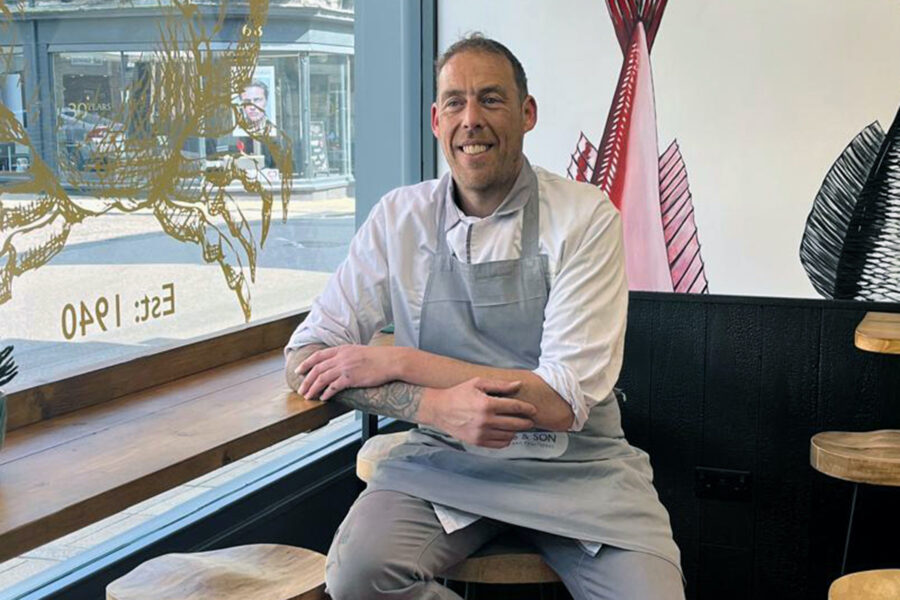“There were a couple of days in the summer when we were short-staffed and were going in at 1.30am,” Darren Jenkins, fourth-generation fishmonger and owner of Jenkins & Son, told Fishing News. “That’s insane – but it’s my business, I choose to do it – the buck stops with me.”
Based in Deal, Kent, Jenkins & Son can trace its roots back to Darren’s great-grandfather Charlie, who started selling from a cart and horse in the 1940s. The business passed down to Darren’s grandfather and father, before he acquired it himself in 2014. It is now the last fish shop left in the town.
Darren and his partner Sacha have ambitious plans – the business has recently relocated to much larger premises, which also incorporate a seafood street food bar, and planning is underway for a rooftop restaurant.
“We moved into the new shop at the end of June. That was a gamechanger for us. We’ve been in here now for just over four months. It’s a big property – we’ve gone from 1,000ft2 to 11,000ft2 – it’s colossal. Hopefully we’ll carry on progressing. I like to think we’re going in the right direction.”

Darren behind the counter at the business’ new, much larger premises – which incorporate a newly launched seafood street food bar. “You have to modernise. Me and my partner Sacha spent a week travelling around the UK last February researching the best fishmongers. We went to Catch at the Old Fish Market down in Weymouth, Osborne’s in Essex and Seafood Shack up in Liverpool.”
As well as running the newly opened seafood bar and supplying fish and shellfish to both retail and hospitality markets, the business also produces its own range of homecooked meals. All of that means an early start to Darren’s day.
“This time of year, I’m in the office at 4.30am. Monday is a paperwork day, so I normally work 6am to 12pm, and Sunday is my day off – but from Tuesday to Saturday, I’m here from 4.30am to 4pm.
“I’m really old-fashioned – in the office I have a sheet of paper with my ‘to do’ list. When I wake up in the morning, I know my first task in the office is to write down everything I have to do – and go from there, ticking it off job by job.
“I’ll start by looking at Brixham and Peterhead fishmarket prices for the fish which I’m going to be purchasing for the following day. I do quite a lot of my ordering straightaway in the morning, as I like to get in early and get the best.
“After that, I’ll start to set up the shop. The staff come in at 5.45am, and then we’ll get set up and do the display. The chefs will be in too, getting prepped up. Until recently, we’ve only been doing lunches from 11am to 2.30pm, but we’ve just launched our breakfast menu – which runs from 8am to 10am.”
Darren’s focus then moves on to deliveries. “The shop opens at 6am, and once the windows and displays are all set up by about 7am, we’ll then crack on with finishing the van orders.
“We have a couple of staff members doing all of the restaurant orders. We have 40 to 50 drops a day, and we get two vans loaded up. We like to get the vans off by 8.30am – 9am at the latest. Sometimes in the summer that’s more challenging, but this time of year, we can get the vans out by 8am – we then concentrate on the shop trade. From 11am to 2pm is our busiest period. The shop is full, and it’s a really good atmosphere in there.”

Despite the pressures of running a rapidly growing, ambitious business, Darren remains hands-on. “We’ve had two bluefin in over the last couple of weeks. They’re a big seller, and good for publicity. We loin them up, and we’ve also been making lots of tuna burgers – we’ve been selling those in the seafood bar, and also on the fishmonger side for people to take home.”
In addition to his customer-facing duties, Darren also has to deal with everyday business matters, from training to staffing issues – and any other problems that may crop up.
“Plenty of things can throw a spanner in the works – normally when you least expect it. We’ll have a van breakdown and the driver is stuck in the middle of nowhere, or an oven has gone down, or a staff member needs some time off – these things all tend to happen on the same day.
“I also have to train our staff. The only problem with training now is that you don’t have the fish. In the past, when we were having tonnes and tonnes of local fish, it was disposable, and we could get people filleting and trained. Now you pay a premium for whole fish. It takes longer to train staff as you haven’t got the quantities of fish. We do get there – but it’s not as quick as it used to be.”
With the end of the day approaching, Darren and his staff begin packing up. “It takes us about an hour and a half, so we start doing that at about 2.30pm. Washing down is a big job, and by the time we’ve done that and cleared everything away, we’re all out the door by 4pm.”
However, as head of a growing, ambitious business, he’s more than happy to put in extra hours if there’s work left to do. “It’s my business – and I chose to do it.
“It’s all on me if I work extra hours – I’m growing, I’m keen and I’m motivated.”
This story was taken from the latest issue of Fishing News. For more up-to-date and in-depth reports on the UK and Irish commercial fishing sector, subscribe to Fishing News here or buy the latest single issue for just £3.50 here.
Sign up to Fishing News’ FREE e-newsletter here.








